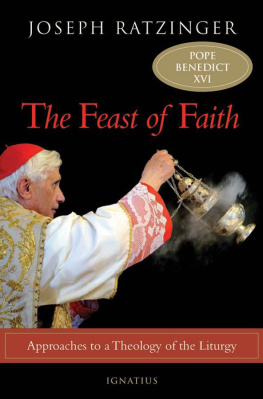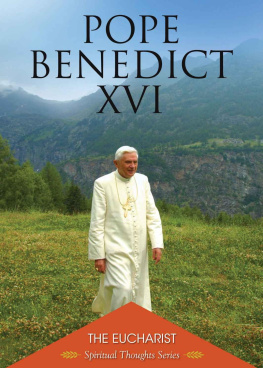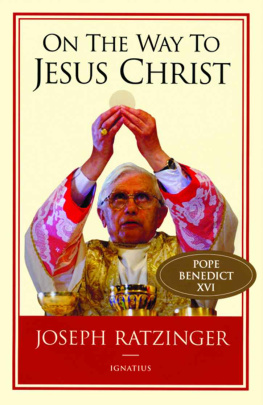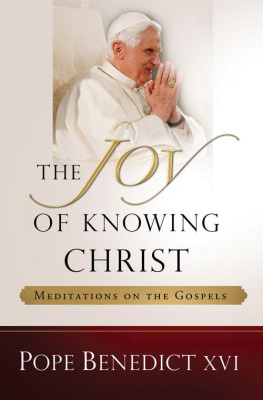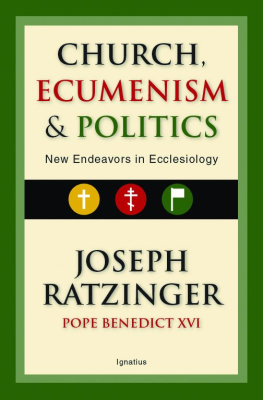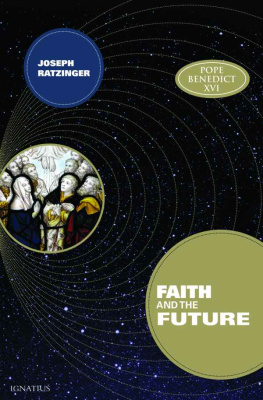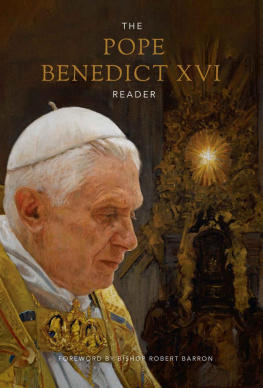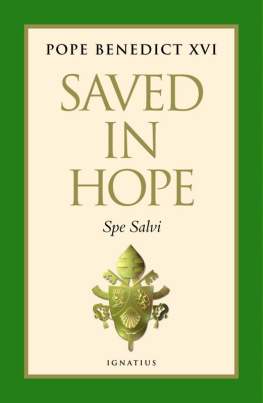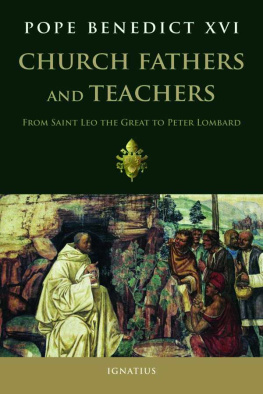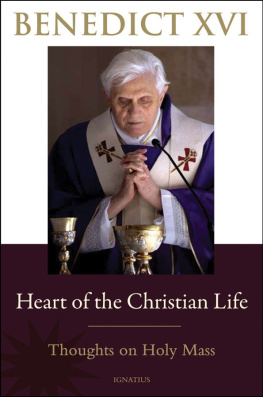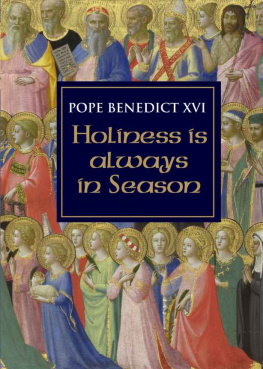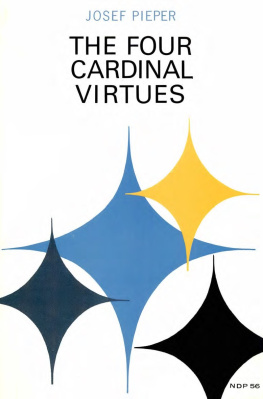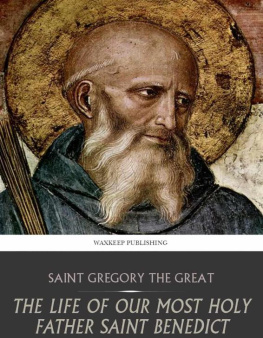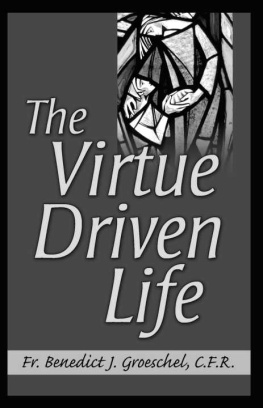The Virtues
The
Virtues
POPE BENEDICT XVI
Collected and edited by Jacquelyn Lindsey
Our Sunday Visitor Publishing Division
Our Sunday Visitor, Inc.
Huntington, Indiana 46750
Unless otherwise noted, the words presented in this book are from Pope Benedict XVI, copyright by Libreria Editrice Vaticana. Used by permission. All rights reserved.
The Scripture citations contained in this work are taken from the Second Catholic Edition of the Revised Standard Version of the Bible (RSV), copyright 1965, 1966, 2006 by the Division of Christian Education of the National Council of the Churches of Christ in the United States of America. Used by permission. All rights reserved.
Excerpts from the Catechism of the Catholic Church, Second Edition, for use in the United States of America, copyright 1994 and 1997, United States Catholic Conference Libreria Editrice Vaticana. Used by permission. All rights reserved.
Copyright 2010 by Our Sunday Visitor Publishing Division Our Sunday Visitor, Inc. Published 2010
15 14 13 12 11 2 3 4 5 6 7 8 9
ISBN 978-1-59276-794-6 (Inventory No. T1099)
LCCN: 2010936165
Cover design by Lindsey Riesen
Interior design by M. Urgo
Cover art: Detail of Prudence
from the Lunette in the Sala dellUdienza, 14961500 (fresco)
by Pietro Perugino (c. 14451523)
Collegio del Cambio, Perugia, Italy / Alinari / The Bridgeman Art Library
Nationality / copyright status: Italian / out of copyright
P RINTED IN THE U NITED S TATES OF A MERICA
Contents
Abbreviations
General Abbreviations
CCCCatechism of the Catholic Church
DVDei Verbum, Dogmatic Constitution on Divine Revelation, Vatican II document
Deus Caritas Est God Is Love, Encyclical, December 25, 2005
Spe Salvi Saved in Hope, Encyclical, November 30, 2007
Scripture Abbreviations
Old Testament
Dt Deuteronomy
Ez Ezra
Hos Hosea
Lev Leviticus
Prov Proverbs
Ps Psalms
Sir Sirach (Ecclesiasticus)
Wis Wisdom
Zech Zechariah
New Testament
Col Colossians
Cor Corinthians
Eph Ephesians
Gal Galatians
Jn John
Lk Luke
Mt Matthew
Pet Peter
Phil Philippians
Rev Revelation
Rom Romans
Thess Thessalonians
Tim Timothy
Tit Titus
Introduction
Virtue is a habitual and firm
disposition to do good.
(CCC 1833)

So faith, hope, love abide, these three;
but the greatest of these is love.
(1 Cor 13:13)
Pope Benedict XVI has regularly woven the theme of the virtues throughout his writings and speeches. This book highlights just some of the jewels of the Holy Fathers teachings on the Theological Virtues of Faith, Hope, and Charity and the Cardinal Virtues of Prudence, Justice, Fortitude, and Temperance.
The world would do well to focus more intently on the Theological and Cardinal Virtues. As the Catechism of the Catholic Church reminds us: A virtue is an habitual and firm disposition to do the good. It allows the person not only to perform good acts, but to give the best of himself. The virtuous person tends toward the good with all his sensory and spiritual powers; he pursues the good and chooses it in concrete actions. The goal of a virtuous life is to become like God (St. Gregory of Nyssa, De beatitudinibus, 1:PG 44, 1200D) (CCC 1803).
Leading a virtuous life leads to God. The Holy Father offers us the roadmap to get there through the Virtues. Those of us still on our earthly pilgrimage are not called to mediocrity. We were created for greatness, for the sublime, to eventually be with Our Lord throughout eternity.
In his letter to the Philippians, St. Paul reminds us: Whatever is true, whatever is honorable, whatever is just, whatever is pure, whatever is lovely, whatever is gracious, if there is any excellence, if there is anything worthy of praise, think about these things (4:8). May this book be a vehicle to do just that through the words of the Holy Father, Pope Benedict XVI.
Jacquelyn Lindsey, Editor

Created in Gods Image
Faith, hope, and charity go together. Hope is practiced through the virtue of patience, which continues to do good even in the face of apparent failure, and through the virtue of humility, which accepts Gods mystery and trusts him even at times of darkness. Faith tells us that God has given his Son for our sakes and gives us the victorious certainty that it is really true: God is love! It thus transforms our impatience and our doubts into the sure hope that God holds the world in his hands and that, as the dramatic imagery of the end of the Book of Revelation points out, in spite of all darkness he ultimately triumphs in glory. Faith, which sees the love of God revealed in the pierced heart of Jesus on the Cross, gives rise to love. Love is the light and in the end, the only light that can always illuminate a world grown dim and give us the courage needed to keep living and working. Love is possible, and we are able to practice it because we are created in the image of God.
Encyclical, Deus Caritas Est, No. 39

PART ONE
The Theological
Virtues
Faith, Hope, and Charity (Love)
There are three theological virtues: faith,
hope, and charity. They inform all the
moral virtues and give life to them.
(CCC 1841)

But, since we belong to the day, let us be
sober, and put on the breastplate of faith
and love, and for a helmet the hope
of salvation. (1 Thess 5:8)
Faith
Faith is the theological virtue by which we believe in God and believe all that he has said and revealed to us, and that Holy Church proposes for our belief, because he is truth itself. By faith man freely commits his entire self to God (DV 5).
CCC 1814
Hope
Hope is the theological virtue by which we desire the kingdom of heaven and eternal life as our happiness, placing our trust in Christs promises and relying not on our own strength, but on the help of the grace of the Holy Spirit. Let us hold fast the confession of our hope without wavering, for he who promised is faithful (Heb 10:23). The Holy Spirit he poured out upon us richly through Jesus Christ our Savior, so that we might be justified by his grace and become heirs in hope of eternal life (Titus 3:67).
CCC 1817
Charity
Charity is the theological virtue by which we love God above all things for his own sake, and our neighbor as ourselves for the love of God.
CCC 1822
Keep Faith, Love, and Hope Alive
The Holy Spirit, who is eternal charity, the bond of unity in the Trinity, with his power of divine charity unites scattered humanity thereby creating the vast multiform community of the Church throughout the world. In the days following the Ascension of the Lord until Pentecost Sunday, the disciples, with Mary, were gathered in the Upper Room to pray. They knew that they themselves could not create or organize the Church: the Church had to be born and organized by divine initiative; she is not created by us, she is a gift of God. And this is likewise the only way in which she creates unity, a unity that must grow. The Church in every time and particularly in these nine days between the Ascension and Pentecost is spiritually united in the Upper Room with the Apostles and Mary to ceaselessly implore the outpouring of the Holy Spirit. Driven onwards by his mighty wind she will thus be able to proclaim the Gospel to the very ends of the earth.
Next page

